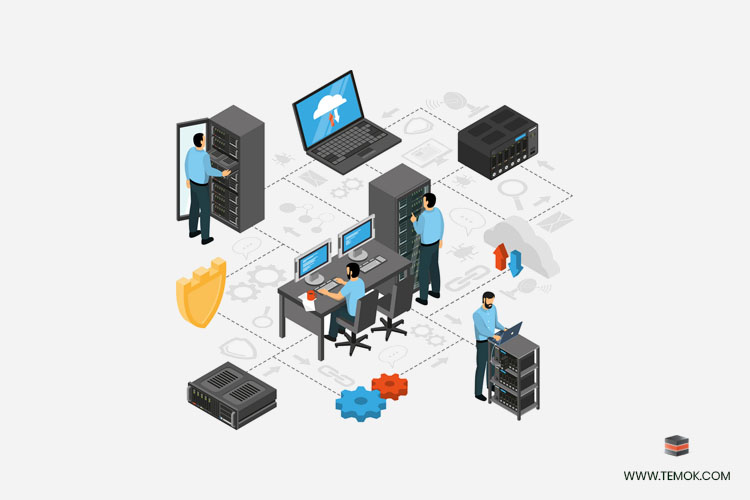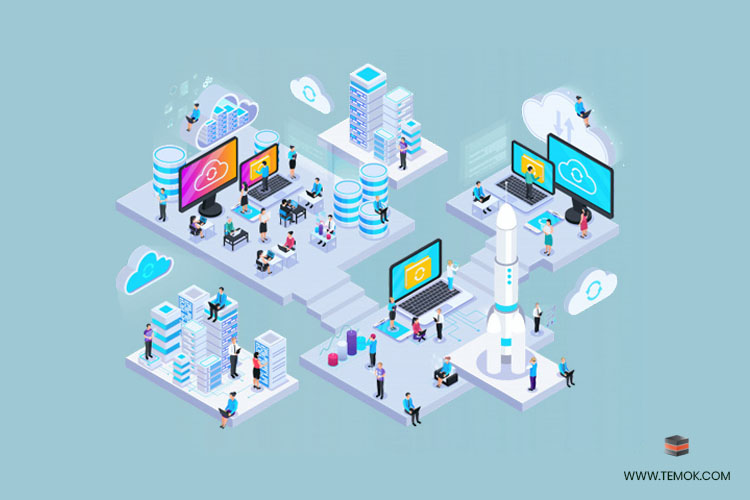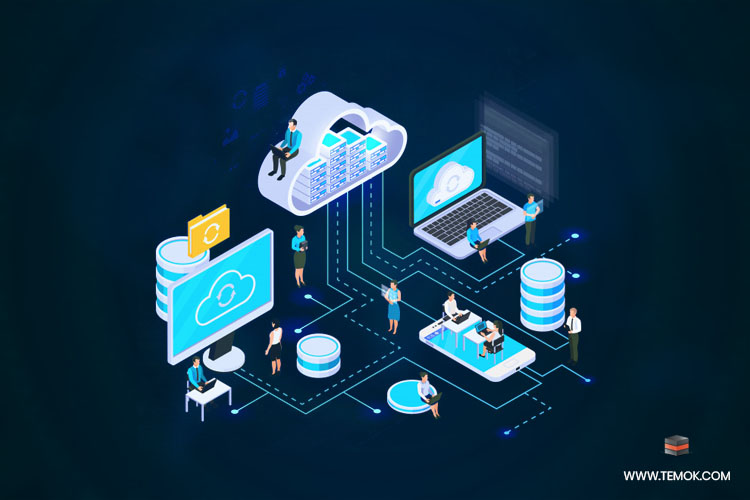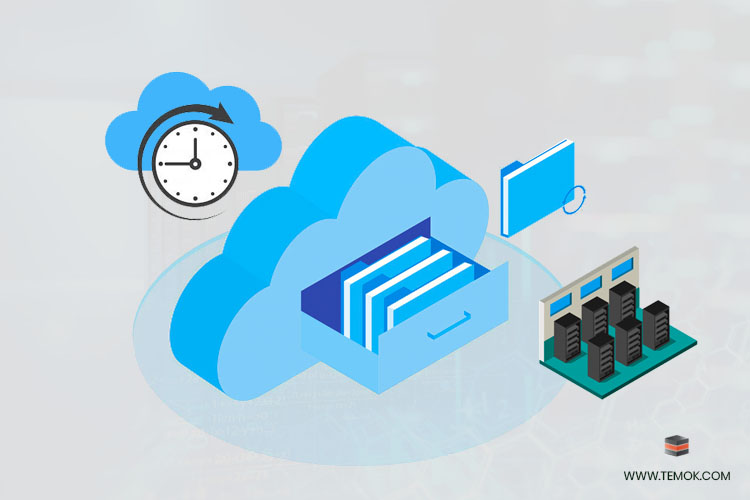Cloud computing is a term used to define a network of remote servers on the Internet that store, manage, and process data in place of local hosting servers. In this article, you will learn the evolution of cloud computing, and how it can solve the trending business needs and challenges. Most businesses are migrating to the cloud because of reduced IT costs, business continuity, scalability, and collaboration efficiency. Let’s have a comprehensive overview of cloud computing history and evolution to understand the real impact on today’s businesses. You will learn about the following stages used to develop, test, and deploy your applications and websites:
Table of Contents
Traditional Datacenters Before The Cloud Innovation

The processes of a traditional business organization are costly and difficult to manage because they need different types of software and hardware to run the business processes more effectively. Before the evolution of cloud technology, the companies were based on the following:
Users
As the companies made their online presence, they assigned different roles to the employees and login credentials to give them access to software and storage space on the company server. These roles may have different levels of permissions to the server and its resources.
Software and Hardware
Those employees who are accessing the server resources run software and applications on their workstations or local machines. The organizations use spreadsheet software, word processors, or any custom software that meets a specific business need. For example, if your company is creating animated movies then software might require faster and more expensive hardware to perform the animation tasks quickly.
Security
To manage all of these interconnected resources, businesses may implement different security layers by reducing access to specific parts of the network, using a firewall, or even hiring Security Operations specialists.
Networks
The employees connect their workstations with the help of the internet or intranet (a private network used within the organization) to manage and store data or information files.
Company Servers
When companies need more processing power to perform any particular tasks over the network, they may install servers. They can also get the services of data centers or datacenters that are based on stacks of storage disks for additional computing power.
IT or Administration Department
The Information Technology department is responsible for maintaining each machine and its software, as well as creating and monitoring employee accounts, security, and server performance. When the data center grows as per the business requirements then the IT team expands it.
Traditional Data Centers
All workstations need to be connected with a central storage space with the help of networks to increase the storage capacity and processing power to meet the trending business needs. The organization would pay for power, hardware, software, human labor, cooling, or other costs before using network applications. Before the evolution of cloud computing, the company’s IT department was also responsible for securing, maintaining, and recurring process reviews for ongoing maintenance.
When you own or rent out data centers, you have to invest a handsome amount of capital. Most of the business startups rent out data centers because they are less expensive in more than one company is sharing the resources. Here is a quick overview of renting and owning a data center.
Traditional Data Centers are based on the following types:
a) Owning A Data Center
b) Renting A Data Center
a) Owning A Data Center

Why Was It Considered Best?
- Fixed annual costs whether they are utilizing the resources or not
- The company’s IT department is responsible for building and maintaining the infrastructure
Why Is It Not A Good Idea Now?
- Employees join another organization or leave legacy systems behind
- Earning upfront CapEx takes time
- Many hardware resources are wasted.
- Setting up a new datacenter according to particular business requirements takes time
b) Renting A Datacenter

Why Was It Considered Best?
- There was no need to make physical lease agreements because the datacenter was originally owned by someone else.
- The IT department can focus on security and administration of the network instead of fixing hardware issues.
- Companies were able to rent space according to their specific needs.
Why Is It Not A Good Idea Now?
- You are sharing resources with other companies which affects performance.
- Renting datacenter space has a higher cost during peak seasons.
- There is no huge price difference as compared to owning a datacenter.
Keep in mind that the future of technology always has roots in the past. So, after the traditional data centers, virtualization technology was introduced to reshape today’s IT industry and will likely play a huge role in the building of next-generation data centers.
Virtualization
As the computing technology improved, the virtualization concept was introduced to reduce the costs of hardware. Instead of a physical server running one operating system Virtual Machines (VMs) made it possible to run several different OS instances on a single machine. This way is efficient and manageable because the organizations can run multiple applications at the same time on a server. Nowadays, the virtualization model is also used by many organizations to optimize the use of their data centers.
Virtual Machines are still restricted by the capacity of the company’s data center, and companies still have to commit a significant amount of upfront CapEx.
Virtualization

Why Was It Considered Best?
- Better optimization of computer hardware
- Hardware scalability with easier upgrade options
- Existing hardware could be utilized more efficiently
Why Is It Not a Good Idea?
- Hardware capacity is still limited in virtualization
- Customer & market demands are not met quickly
- It is difficult to manage security threats
Cloud Computing
In this digital world, businesses are offering their services and products regionally and globally. So, it is critical to scale quickly and securely in an efficient manner.
Maintaining data centers and their network connections is not only expensive but also not possible at the scale they require. Moreover, given the data volume and the rate at which companies/businesses are collecting it, gaining better insights quickly has become increasingly paramount to business success. It is changing the way business has to work. High upfront costs, large data volumes, collaboration needs, and innovation in today’s exceedingly competitive global market have driven the need for transformation.
Cloud Computing

Is It Considered Best Now?
- It builds more secure and trusted infrastructure
- Access to automatic updates and turning the data into business advantages
- Increase productivity, innovation, and collaboration for great results
- Connect to partner platforms and reduce IT costs
- Operational expenditure (OpEx) instead of capital expenditure (CapEx)
Is It Not The Only Solution?
- Running business brands don’t have to give up their existing technology; they can complement it with the cloud
- People, business processes, and internal policies will also have to support the cloud adoption.
- Regulations might mean extra due diligence for moving to cloud technology.
Why Cloud Hosting Services?

In the diagrams, the cloud symbol indicates a network managed by somebody else and based on the collection of cloud computing services. Many vendors are offering their cloud services after the evolution of cloud technology. These cloud services provide businesses around the world access to a pool of configurable resources of the IT infrastructure. This is done through a pay-what-you-use basis and offers additional opportunities to significantly reduce an organization’s fixed (capital) costs as well as help them prepare for future growth.
How To Solve Key Business Challenges?
Serverless Solution
Serverless solutions mean having “No servers” but of course, that’s not it. You need a server for hosting your data and it is a way of letting customers know that they don’t need to concern themselves with server management anymore! They can only focus on using the excellent solutions offered through Top Cloud Vendors and they will take care of the server part.
So, the heavy task for your IT department is done. There is no need to set up, manage, and optimize data center resources because the hosting providers will take care of serverless solutions. Free up your IT team for other tasks and help the company to increase overall productivity.

Benefits Of Serverless Solutions
a) No Need For Data Center Experts
On-premises data centers require full-time expert employees to maintain the services without any downtime. Serverless can remove the manual tasks by automating server management, like security patches and scaling your server cluster, etc.
b) Opportunity To Develop New Technology
Technical and non-technical professionals can dedicate their time to developing new technology and can add value to the business, instead of monitoring and maintaining the repetitive data center tasks.
c) Per-second Billing
The evolution of cloud computing makes it possible to overcome the risks of natural disasters and speed up the recovery processes to survive businesses in any situation. It has automatic scaling and the cloud vendor will only charge for services used.
d) Auto-scalable Storage
Whether the business is using Managed Amazon Cloud (AWS) hosting or any other well-reputed cloud hosting services the added storage and processing power allows it to sort and sift through the data with ease. Business owners don’t need to worry about the increasing storage needs because cloud computing is auto-scalable.
What Else Makes Cloud Platforms So Great?
So far, we have broken down the evolution of cloud computing, defined the ways it opens up global business opportunities, and described some of the amazing benefits of using cloud hosting. Make your business more agile and focus on building effective strategies.
What is An Agile Business?
These types of businesses make change a routine part of organizational life and respond effectively to new opportunities and challenges promptly. They can easily react to changing market trends and transform ideas into development faster than traditional organizations. Before the evolution of cloud computing the traditional technology structures can often prevent an organization from becoming more agile. If any business owns its data center and uses traditional server technology then developing, deploying, and launching applications is not an easy task.
Testing and implementing new and innovative ideas require a trip to the IT department for hardware, software, and storage setup. All these components may have to be delivered, installed, configured, and deployed, then the new idea becomes just another item on a waiting list.
Make Your Business More Agile

Make your business more agile with the help of reliable cloud hosting and get the following benefits:
1. Effective Response To Security Threats
Different types of security threats are constantly growing, and businesses need extensive resources to keep ahead of new vulnerabilities.
2. Always Make Data-driven Decisions
When it comes to financial costs and technology, organizations need their data to be easily stored, accessed, processed, and managed at a low cost. This would help them to make data-driven decisions easier.
3. Only Pay What You Use
Organizations need a service model to justify and accurately forecast on-demand costs for services and solutions. Nowadays, with the option of billed per-second billing, customers can pay for what they Use.
4. Strategic and Innovative Work
Businesses can reduce the time spent configuring servers because of cloud computing and focus on higher-valued strategic and innovative work.
5. Quick Response To Security Threats
All businesses having traditional methods are 100% responsible for securing their entire hardware and software, from physical machines to the applications that run over the internet. Once the security breach occurs, they are limited to their resources. In many cases, if hackers get access to an organization’s network, they face far fewer obstacles and defenses. So, if you are using traditional hosting then understand what is a data breach, its causes, process, and prevention methods to secure your confidential data.
When the companies get cloud hosting then the service evolution Of Cloud computing providers will take care of data center security with the help of a professional team. So, it is a cost-effective solution because if you hire a team to secure the network and other technical tasks then it will cost too much.

Sharanpreet Kaur
Great blog on evolution of cloud computing. Wonderful information.
Nisha Batel
Great to know about cloud computing.
Aryan Bansal
Informative And helpful blog. Keep Sharing. Thanks.
Ashley Woods
Quite an informative read! Cloud computing is indeed the future. It is estimated that the public cloud computing market will continue to grow and reach almost 397 billion U.S. dollars in 2022.
Ashley Woods
Thanks for sharing this interesting information! The term “cloud computing” refers to the practice of renting computing resources. Cloud spending is being driven by emerging technologies, which are becoming more mainstream. Global end-user public spending on cloud services is expected to rise 23.1 percent to $332.3 billion in 2021, up from $270 billion in 2020.